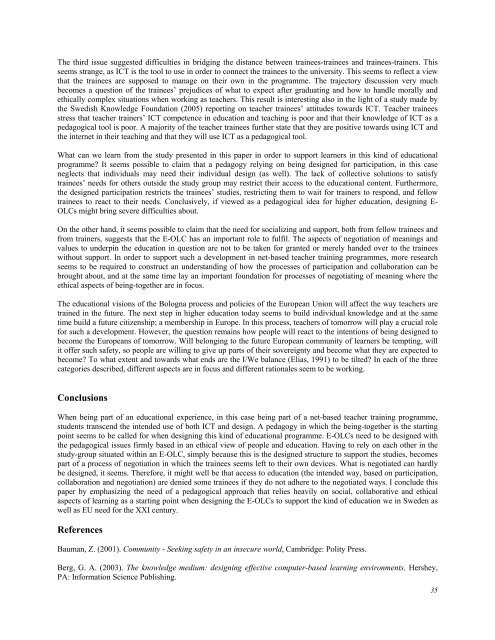October 2007 Volume 10 Number 4 - Educational Technology ...
October 2007 Volume 10 Number 4 - Educational Technology ...
October 2007 Volume 10 Number 4 - Educational Technology ...
Create successful ePaper yourself
Turn your PDF publications into a flip-book with our unique Google optimized e-Paper software.
The third issue suggested difficulties in bridging the distance between trainees-trainees and trainees-trainers. This<br />
seems strange, as ICT is the tool to use in order to connect the trainees to the university. This seems to reflect a view<br />
that the trainees are supposed to manage on their own in the programme. The trajectory discussion very much<br />
becomes a question of the trainees’ prejudices of what to expect after graduating and how to handle morally and<br />
ethically complex situations when working as teachers. This result is interesting also in the light of a study made by<br />
the Swedish Knowledge Foundation (2005) reporting on teacher trainees’ attitudes towards ICT. Teacher trainees<br />
stress that teacher trainers’ ICT competence in education and teaching is poor and that their knowledge of ICT as a<br />
pedagogical tool is poor. A majority of the teacher trainees further state that they are positive towards using ICT and<br />
the internet in their teaching and that they will use ICT as a pedagogical tool.<br />
What can we learn from the study presented in this paper in order to support learners in this kind of educational<br />
programme? It seems possible to claim that a pedagogy relying on being designed for participation, in this case<br />
neglects that individuals may need their individual design (as well). The lack of collective solutions to satisfy<br />
trainees’ needs for others outside the study group may restrict their access to the educational content. Furthermore,<br />
the designed participation restricts the trainees’ studies, restricting them to wait for trainers to respond, and fellow<br />
trainees to react to their needs. Conclusively, if viewed as a pedagogical idea for higher education, designing E-<br />
OLCs might bring severe difficulties about.<br />
On the other hand, it seems possible to claim that the need for socializing and support, both from fellow trainees and<br />
from trainers, suggests that the E-OLC has an important role to fulfil. The aspects of negotiation of meanings and<br />
values to underpin the education in question are not to be taken for granted or merely handed over to the trainees<br />
without support. In order to support such a development in net-based teacher training programmes, more research<br />
seems to be required to construct an understanding of how the processes of participation and collaboration can be<br />
brought about, and at the same time lay an important foundation for processes of negotiating of meaning where the<br />
ethical aspects of being-together are in focus.<br />
The educational visions of the Bologna process and policies of the European Union will affect the way teachers are<br />
trained in the future. The next step in higher education today seems to build individual knowledge and at the same<br />
time build a future citizenship; a membership in Europe. In this process, teachers of tomorrow will play a crucial role<br />
for such a development. However, the question remains how people will react to the intentions of being designed to<br />
become the Europeans of tomorrow. Will belonging to the future European community of learners be tempting, will<br />
it offer such safety, so people are willing to give up parts of their sovereignty and become what they are expected to<br />
become? To what extent and towards what ends are the I/We balance (Elias, 1991) to be tilted? In each of the three<br />
categories described, different aspects are in focus and different rationales seem to be working.<br />
Conclusions<br />
When being part of an educational experience, in this case being part of a net-based teacher training programme,<br />
students transcend the intended use of both ICT and design. A pedagogy in which the being-together is the starting<br />
point seems to be called for when designing this kind of educational programme. E-OLCs need to be designed with<br />
the pedagogical issues firmly based in an ethical view of people and education. Having to rely on each other in the<br />
study-group situated within an E-OLC, simply because this is the designed structure to support the studies, becomes<br />
part of a process of negotiation in which the trainees seems left to their own devices. What is negotiated can hardly<br />
be designed, it seems. Therefore, it might well be that access to education (the intended way, based on participation,<br />
collaboration and negotiation) are denied some trainees if they do not adhere to the negotiated ways. I conclude this<br />
paper by emphasizing the need of a pedagogical approach that relies heavily on social, collaborative and ethical<br />
aspects of learning as a starting point when designing the E-OLCs to support the kind of education we in Sweden as<br />
well as EU need for the XXI century.<br />
References<br />
Bauman, Z. (2001). Community - Seeking safety in an insecure world, Cambridge: Polity Press.<br />
Berg, G. A. (2003). The knowledge medium: designing effective computer-based learning environments, Hershey,<br />
PA: Information Science Publishing.<br />
35

















